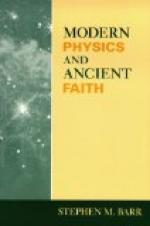Last summer I heard, on good authority, that Mr. Willson had thought himself into a most suggestive way of dealing with the problems of matter and spirit, a way which, besides being suggestive, bore a great resemblance to some theories of the same nature, current in ancient India. Consequently Mr. Willson was offered, for the first time in his life, a chance of expressing his views on matter and spirit in as many articles and in as extensive a shape as he chose. The way he received this tardy recognition of the fact that he had something to say was highly instructive. He did not put on airs of unrecognized greatness, though, I own, the occasion was propitious; he did not say, “I told you so;” he simply and frankly was glad, in, the most childlike way.
And now that I have used the word, it occurs to me that “childlike” is an adjective the best applied to this man, in spite of his portliness, and his three score and more winters.
Many a pleasant hour I have spent in the small bookroom of the great “World” building. With Mr. Willson talk never flagged. We discussed the past and the future of our planetary chain, we built plans for the true and wholesome relation of sexes, we tried to find out—and needless to say never did—the exact limit where matter stopped being matter and became spirit; we also read the latest comic poems and also, from time to time, we took a header into the stormy sea of American literature in order to find out what various wise heads had to say, consciously or unconsciously, in favour of our beloved Theosophical views. And all this, being interrupted every three minutes or so by some weary apparition from some workroom in the “World” with some such question: “Mr. Willson, how am I to find out the present whereabouts of this or that Russian man-of-war? Mr. Willson, what is the melting point of iron? Mr. Willson, when was `H.M.S. Pinafore’ produced for the first time?” etc., etc. And every time, Mr. Willson got up in the leisurely manner peculiar to him, reached for some book from the shelves that lined the room, gave the desired information, and as leisurely returned to the “pranic atom,” or to “come and talk man talk, Willy,” or to whatever our subject chanced to be at the time.
Mr. Willson’s gratitude to the Theosophical Forum for its recognition was disproportionately great. As he wrote to the Editor: “give me any kind of work, writing for you, reviewing, manuscript or proof reading, I shall do anything, I shall undertake any job, even to taking editorial scoldings in all good nature, only give me work.” His devotion to Theosophical thought and work in all their ramifications was just as great, as was his freedom from vanity, his perfectly natural and unaffected modesty.
At the news of his death many a heart was sincerely sad, but none so sad as the heart of the editor of the Theosophical Forum. For a friend and co-worker like T.E. Willson, ever ready to give material help and moral encouragement, is not easily replaced.




